The most common question we hear from customers: “How is [insert brand name] using AI?”
Many go-to-market teams are still figuring out how to incorporate AI into their day-to-day workflows.
They want to know what the highest-performing teams are doing. And we want to help.
That’s why we’re kicking off the inaugural edition of our GTM AI Leader Awards.
Not just to recognize the GTM leaders pioneering AI-native revenue strategies, but to show other Common Room customers how they can leverage AI, signals, and modern data infrastructure to transform their pipegen motions.
Here, in alphabetical order, are the top 5 GTM AI leaders for fall 2025.
How we picked our winnersOur customer success team nominated customers based on their activities over the past three months. We then scored nominees using the following rubric:
- Signal intelligence: Capturing dark-funnel signals across multiple channels
- Person-level precision: Moving beyond account-only to person-first GTM
- AI-powered action: Using AI for research, prioritization, and outbound at scale
- Measurable impact: Achieving lifts in reply rates, pipeline velocity, or conversion
- Innovation and vision: Pioneering new plays that others will want to replicate
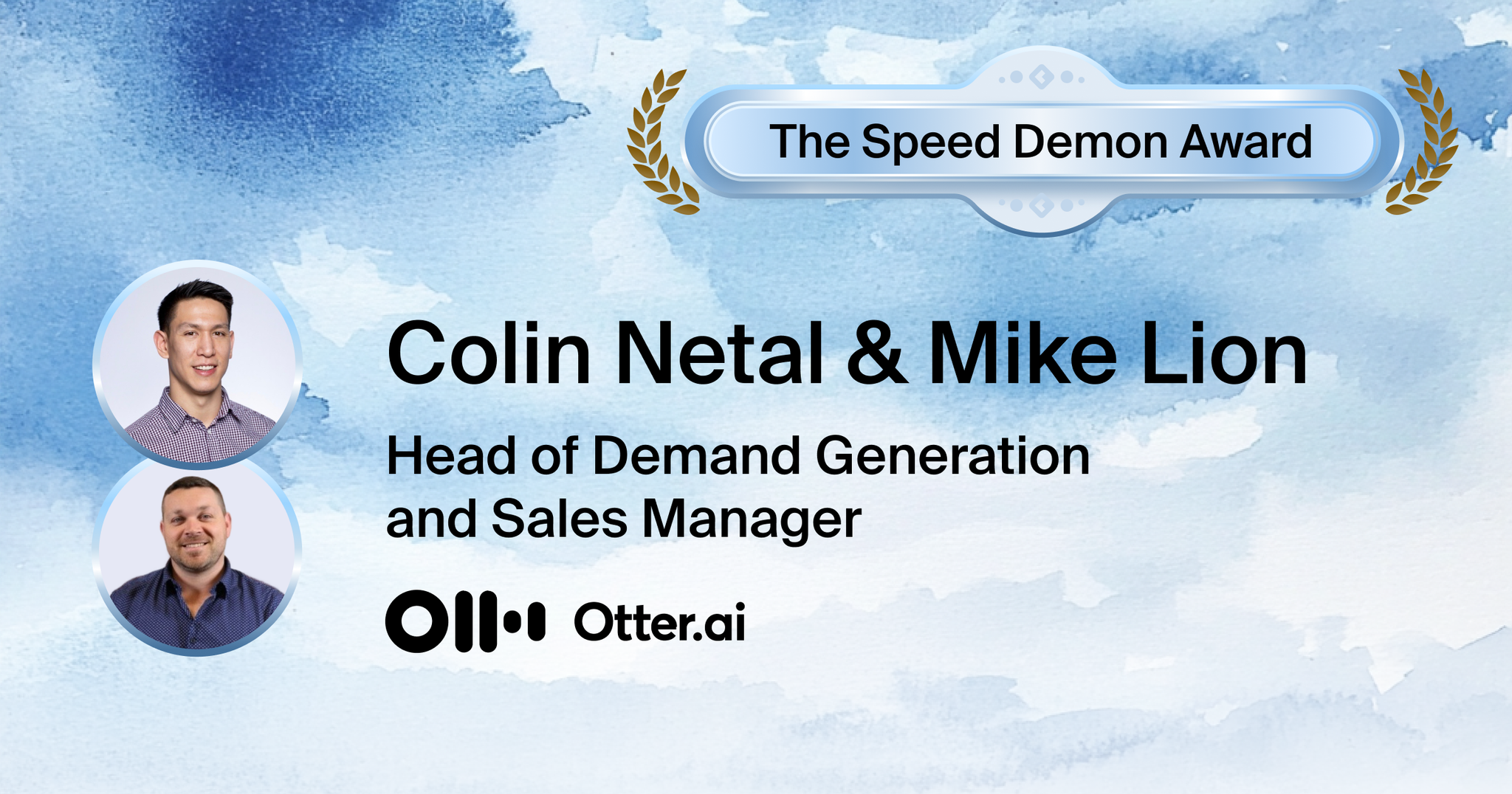
1. Colin Netal and Mike Lion
As Head of Demand Generation at Otter.ai, Colin knows that actioning on market interest is just as crucial as building it. And as Sales Manager at Otter, Mike has years of experience as both a sales leader and AE to draw on.
Challenge
- Otter was moving from a mostly self-serve product-led growth motion to a more sales-assisted model.
- Sales reps were bombarded with product sign-ups, but had limited visibility into actual product usage.
- AEs were time-poor and lacked a reliable way to prioritize the right leads at the right time.
Innovation
- Colin and Mike used Common Room’s automated list building to route product-qualified leads to reps based on a combination of ideal customer profile and ideal persona, then layered on product usage data and high-intent website activity to prioritize the hottest leads.
- AEs began incorporating RoomieAI™ Capture for account-level research, focusing on insights related to competitive analysis and tech consolidation opportunities.
- Team members also began using RoomieAI Activate to generate prospect-level messaging and speed up tailored outreach.
- By combining these AI agents with Common Room’s workflow automations, Otter can now explore fully automated outbound for non-owned accounts.
- Otter auto-segments economic buyers at product-qualified accounts who signed up for the product in the last 28 days.
- These segments are automatically updated based on an AE’s book of business.
- Reps can click into the segment to see a list of hot prospects assigned to them, a signal-based score (including the context behind the score), and when and where the prospect was last seen on the website.
- From here, reps can activate RoomieAI Spark, Common Room’s person-level research agent, to get a better understanding of why and how to approach the prospect, draft an AI message tailored for EBs who are active in Otter’s product, and send or sequence via Outreach with one click.
Impact
- Otter booked 11 meetings within two weeks of launching Common Room with its AE team (10 sourced through Common Room, one influenced by Common Room).
- This was accomplished with very basic product usage data pumped in from Salesforce and Common Room’s out-of-the-box signal capture and AI waterfall enrichment.
- The next step is bringing in more product data from Snowflake for strategic plays built around power users and account expansion opportunities.
Why they won
- Colin and Mike moved from concept to pipeline in only 14 days. They show how GTM AI is something you can kick off rapidly and iterate on over time.
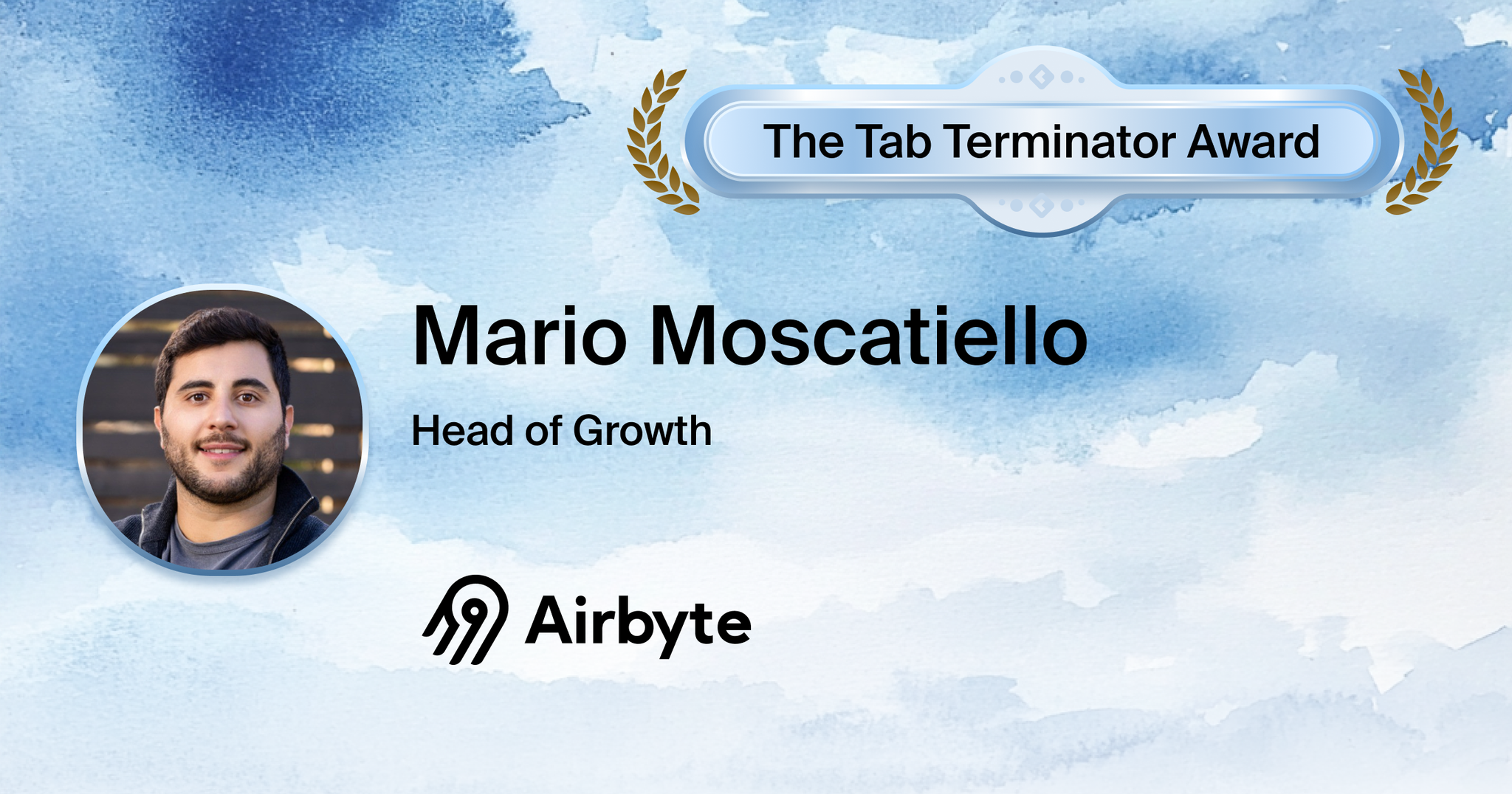
2. Mario Moscatiello
As Head of Growth at Airbyte, and a growth leader at multiple fast-growing companies, Mario knows the importance of eliminating friction in order to scale.
Challenge
- Airbyte was building a new outbound motion, requiring not only new headcount, but new data and tooling.
- BDRs required a way to quickly identify intent across channels and cross-reference it with ideal customer profile fit.
- The team wanted to lean into a hybrid of top-down and bottom-up sales—capturing intent signals below the line and using them to target decision-makers above the line.
Innovation
- Mario used Common Room’s automated signal capture, AI waterfall enrichment, and scoring to help BDRs rapidly identify, prioritize, and take action on leads based on a combination of intent signals (GitHub activity, web visits, etc.) and firmographic fit, all in one place.
- The team used Prospector to identify economic buyers within target accounts and bring new titles and roles directly into the BDR workflow without the need to pivot to another tool.
- Most recently, the team began using RoomieAI Spark to serve up person-level research about the hottest leads to reps in Slack to accelerate speed to lead. Together with RoomieAI Activate, Mario is automating as much of the signal-to-send workflow as possible.
- Airbyte auto-segments prospects at ICP-match accounts who meet a certain threshold for open-source activity.
- These segments are automatically updated based on a rep’s book of business.
- If prospects in the segment aren’t decision-makers, reps can use Prospector to automatically identify and enrich economic buyers within the organization using a proprietary database of more than 200 million B2B contacts and accounts.
- Reps are able to send or sequence with a click, as well as generate tailored messaging via AI agent that they can fine-tune with an AI writing assistant.
Impact
- Since rolling out Common Room, Airbyte exceeded its annual pipeline numbers in half the time—a 10% year-over-year increase in only six months.
- In addition to faster, more targeted pipegen, Airbyte’s marketing team has also found value in Common Room for ABM campaigns.
Why they won
- Mario made it easier for sales to not only engage more leads, but also engage better ones. He shows how GTM AI can help automate away the grunt work of various sales processes to help reps focus on what they do best.
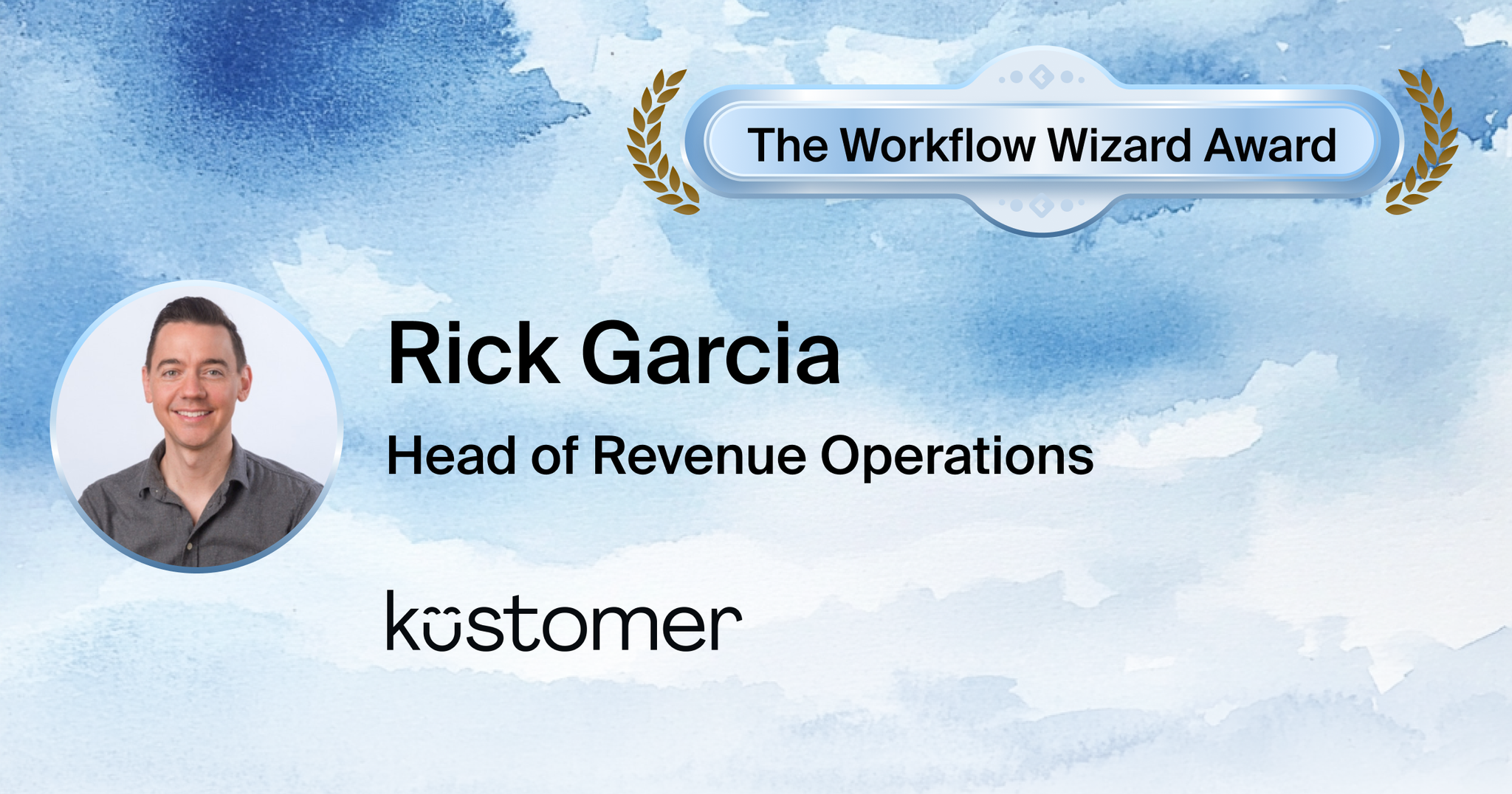
3. Rick Garcia
As Head of Revenue Operations at Kustomer, and a long-time consultant on building scalable operations strategies for high-growth companies, Rick is very familiar with building business systems that drive ROI.
Challenge
- Kustomer’s BDRs and AEs lacked the necessary intent data to help them target and prioritize the right prospects and accounts.
- The GTM org’s SFDC instance was bogged down with stale data and duplicate records.
- Together, this made it difficult for reps to consistently reach high-intent, high-fit prospects at the right time.
Innovation
- Rick and his team not only delivered buyer intelligence to BDRs and AEs in Common Room, but empowered reps to take that intel with them wherever they work via a Chrome Extension for Salesforce and LinkedIn and real-time Slack alerts.
- AEs are also using RoomieAI Activate to assist with message generation. Relevant outbound copy is pushed directly to Gong Engage sequences from Common Room for rapid speed to lead.
- Kustomer auto-segments prospects visiting high-intent pages on its website and assigns bespoke segments to AEs based on their books of business.
- AEs can click into a segment to see fit and intent scores at both the contact and account level that reveal key demographic and firmographic information, including the number of pages a prospect has visited on the site and their organization’s current tech stack.
- Reps are also able to quickly see whether the prospect is an economic buyer or ideal persona, when they were last seen on the website, the last URL they visited, and whether they belong to a target account.
- AEs can then draft an AI message using RoomieAI Activate that’s customized for web activity and send prospects to a Gong flow directly from Common Room—or access all the same intelligence and actions from the prospect’s record in SFDC or profile on LinkedIn.
Impact
- Kustomer has seen a significant increase in pipeline, as well as improvement in stage 1-to-stage 2 conversion rates.
Why they won
- Rick met his reps where they are, not just where he wants them to be. He shows how GTM AI works best when it enhances workflows instead of disrupting them.
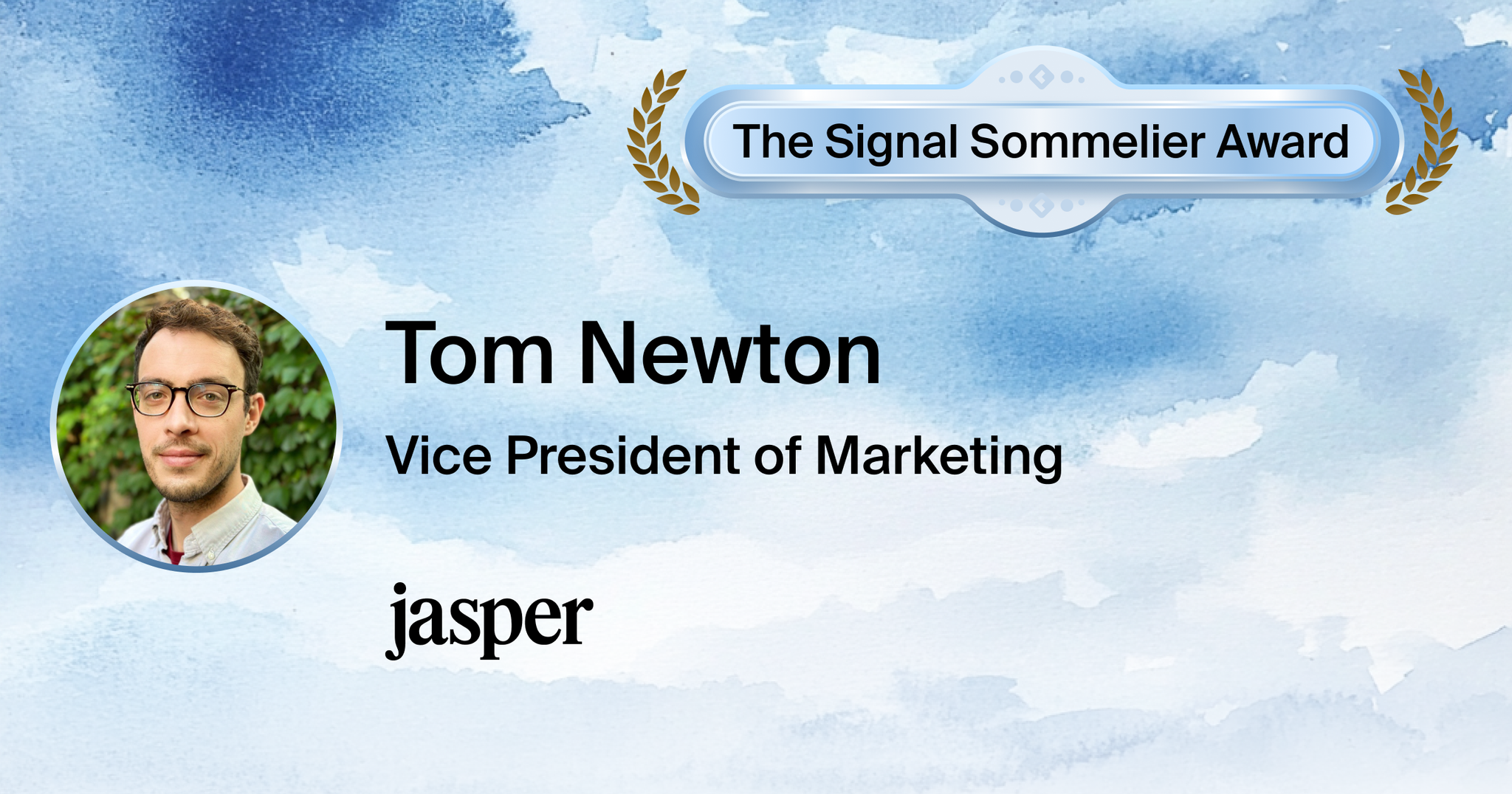
4. Tom Newton
As the Vice President of Marketing at Jasper—and a former growth marketing leader at multiple companies—Tom knows the impact of data quality on marketing and sales alignment firsthand.
Challenge
- Jasper’s sales reps struggled to get visibility into and take action on buyer intent signals.
- The data they had access to was decentralized, lacked person-level enrichment, and was missing key context from other channels.
Innovation
- Tom and his team overhauled Jasper’s inbound motion using first-, second-, and third-party signals from Common Room.
- For example, when economic buyers visit high-intent webpages on Jasper’s site or engage with the brand on social media, BDRs and AEs are alerted in real time via Slack notifications.
- The team has also begun using RoomieAI Capture to identify business-relevant third-party intel to help prioritize accounts based on data points like recent funding and regional expansion.
- This is helping reps uncover timely opportunities for outreach and break into new business segments.
- Jasper auto-segments prospects at target accounts that have recently engaged with the company on LinkedIn and X (Twitter) and delivers these lists to BDRs based on account ownership.
- BDRs can click into a segment to see the volume of social activity for each prospect, and click into the prospect’s profile to see exactly what occurred across social channels.
- Beyond social data, BDRs can easily view the prospect’s ICP score, website activity, job-change history, and more, as well as click into their company to surface AI research related to job listings, earnings calls, and recent activities from other contacts at the account that could help with prioritization and messaging.
- From here, reps are able to add prospects to an Outreach sequence or HubSpot workflow with the press of a button.
Impact
- Jasper is now using intent signals to build its first outbound motion as well as support inbound pipegen.
- The team as a whole is taking a more targeted approach to both inbound and outbound leads.
Why they won
- Tom didn’t just improve existing processes—he laid the groundwork for an entirely new pipegen motion. He shows how GTM AI helps you both optimize what’s working and explore what wasn’t previously possible.
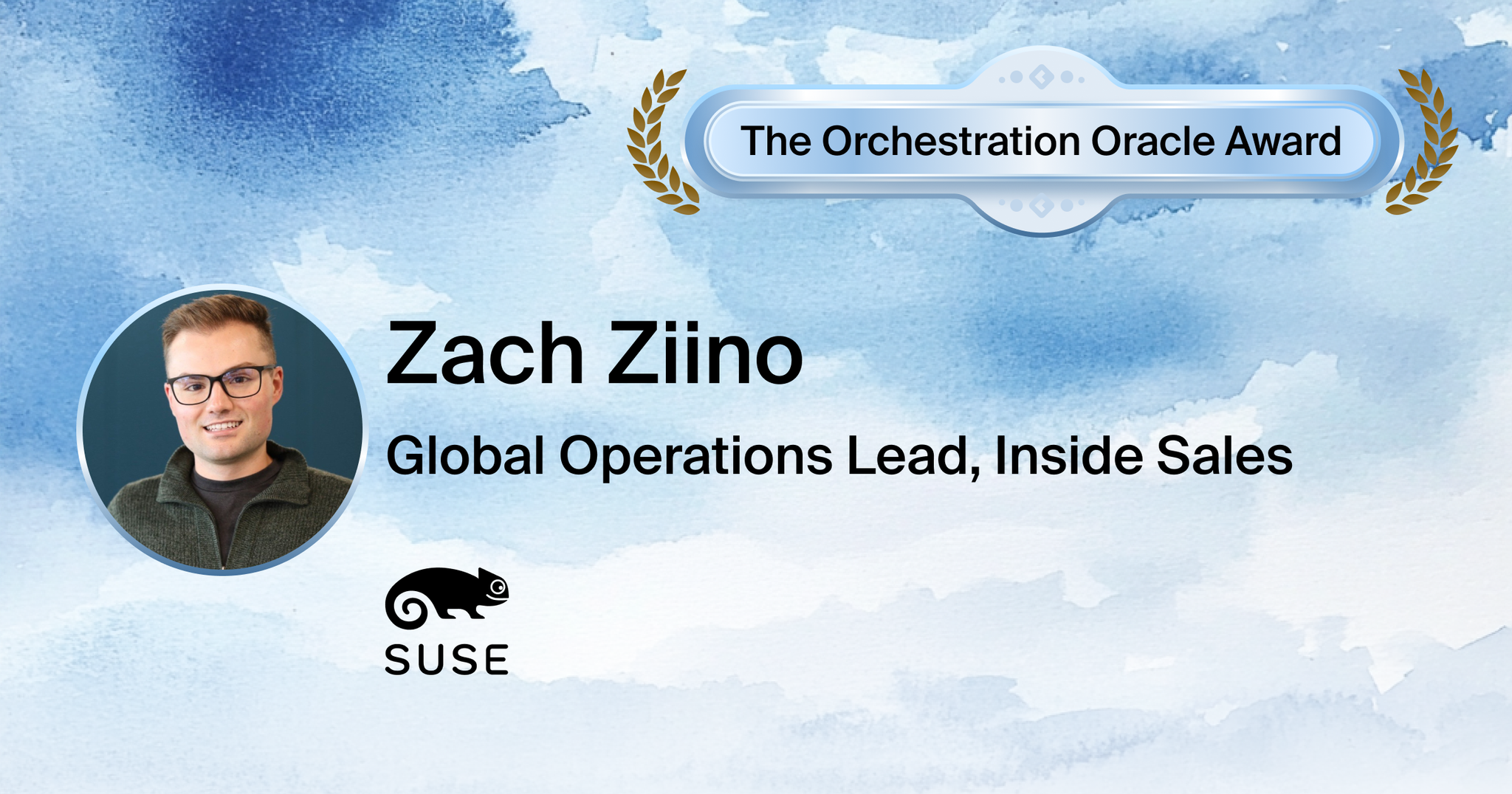
5. Zach Ziino
As the Global Operations Lead for Inside Sales at SUSE—and a former SDR himself—Zach understands how important it is to provide sales teams with clear, actionable insights instead of asking them to hunt for them.
Challenge
- SUSE’s inside sales team lacked unified visibility across signal sources, its CRM, and its sales execution platform.
- Reps struggled to identify true buying intent and prioritize outreach effectively.
Innovation
- Zach and his team centralized all engagement data in Common Room to create an ML-powered, signal-based prioritization model.
- The team integrated Common Room directly with Salesforce and Clari Groove to surface signals within existing workflows.
- This allowed the team to simplify execution from signal to send and enabled reps to act faster on high-fit accounts.
- SUSE auto-segments account-qualified leads using internal criteria logged in Salesforce and delivers them to inside sales representatives based on SFDC ownership.
- Each segment acts as a single pane of glass where ISRs can get up to speed on high-intent, high-fit prospects by seeing signal-based scores, website visits, GitHub stars, LinkedIn reactions, and more, all in one place.
- From here reps can receive a person-level research summary from RoomieAI Spark, complete with an explanation of why they should prioritize the prospect and how to approach outreach.
- Then they can add prospects to a Groove flow or Salesforce campaign without ever switching screens.
Impact
- SUSE streamlined prospecting and reduced manual research for frontline sellers.
- This accelerated speed to lead and increased conversion rates from prioritized accounts.
- Additionally, by unifying data sources under a single view, sales and marketing aligned on shared signals.
Why they won
- Zach championed a scalable, signal-first GTM approach that modernized outbound execution at his organization while balancing innovation with pragmatism. He shows how GTM AI works best when it’s built on the unique data that matters to your business.
Key takeaways from GTM AI leaders
There’s no one playbook for GTM AI.
Every org has different pain points, priorities, and areas of opportunity.
That said, you can learn a lot from these five leaders:
- Speed wins: You don't need fully optimized conditions to start your GTM AI journey. The important thing is to just start.
- Automate easy wins: There are tedious, time-consuming tasks reps slog through every day. Rack up quick wins by taking humans out of the loop where they don’t need to be.
- Meet reps where they work: The fewer tabs reps have to toggle to action on AI, the faster they’ll adopt it. Connect intelligence to the tools and workflows reps already have.
- New context unlocks new opportunities: AI puts previously hidden intel at your fingertips. Explore how to apply it to your unique pipegen motion.
- Start with the lowest-hanging fruit: Clear prioritization frameworks built around obvious areas of opportunity will generate wins faster than scattershot use cases.
From segmentation and scoring to research and messaging, these GTM leaders are showing what’s possible with AI purpose-built for pipegen.
Here’s to our inaugural roster of GTM AI leaders. And here’s to many more!
Become a GTM AI leader with Common Room
Get in touch to see how Common Room’s GTM AI shows you who to target, when to engage, and how to convert.

